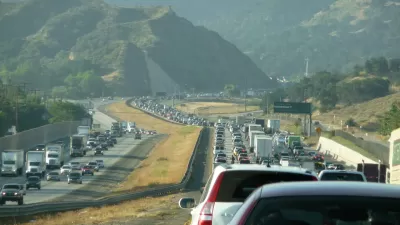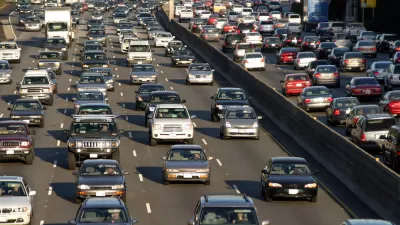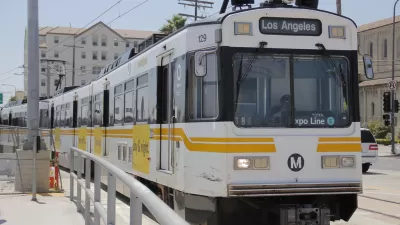Architect and planner Gerhard W. Mayer asserts that a city developed to accommodate cars is no place for paltry public transit offerings; Los Angeles needs major changes to its DNA if it wants to remain viable.

"Decades of development and sprawl are rightfully blamed for the degradation of our quality of life, and for our near unbearable congestion. This has turned many Angelenos against development and into NIMBY activists ready to object anytime to anything. But contrary to NIMBY creed, we cannot do nothing. The path we are on is really an economic fiasco in waiting," writes Mayer.
"In greater Los Angeles, we are using more than 60 percent of our land for our automobiles (roads, parking lots, landscaped buffers, traffic islands, etc.)." This, he says, is a recipe for economic disaster because a smaller proportion of the city creates value. He offers a vision of a new Los Angeles where the millions of dollars currently wasted in traffic can be diverted to a vibrant local economy and where quality of life is excellent.
"Imagine our city with bustling pedestrian zones, coffee shops, and corner stores, markets, plazas, and lots of housing options surrounding our public transit hubs. Then imagine those hubs separated by low-density areas filled with picturesque narrow residential streets, bicycle networks, community gardens, and parks. All could be connected with public transit, and all of this in our near-perfect climate, and you could still drive, if you chose to."
"But we cannot achieve this by only making minor adjustments to our land-use laws based on the popular consensus of people who want to continue to drive yet want all the other people to get off the road. We need to change much more rapidly and radically and we must get people mobilized toward change. We must create grass roots “YIMBY” (Yes, in my yard!) movements that demand different solutions; that is really the challenge of our time."
FULL STORY: Driving Toward Bankruptcy

Planetizen Federal Action Tracker
A weekly monitor of how Trump’s orders and actions are impacting planners and planning in America.

Maui's Vacation Rental Debate Turns Ugly
Verbal attacks, misinformation campaigns and fistfights plague a high-stakes debate to convert thousands of vacation rentals into long-term housing.

Restaurant Patios Were a Pandemic Win — Why Were They so Hard to Keep?
Social distancing requirements and changes in travel patterns prompted cities to pilot new uses for street and sidewalk space. Then it got complicated.

In California Battle of Housing vs. Environment, Housing Just Won
A new state law significantly limits the power of CEQA, an environmental review law that served as a powerful tool for blocking new development.

Boulder Eliminates Parking Minimums Citywide
Officials estimate the cost of building a single underground parking space at up to $100,000.

Orange County, Florida Adopts Largest US “Sprawl Repair” Code
The ‘Orange Code’ seeks to rectify decades of sprawl-inducing, car-oriented development.
Urban Design for Planners 1: Software Tools
This six-course series explores essential urban design concepts using open source software and equips planners with the tools they need to participate fully in the urban design process.
Planning for Universal Design
Learn the tools for implementing Universal Design in planning regulations.
Heyer Gruel & Associates PA
JM Goldson LLC
Custer County Colorado
City of Camden Redevelopment Agency
City of Astoria
Transportation Research & Education Center (TREC) at Portland State University
Jefferson Parish Government
Camden Redevelopment Agency
City of Claremont





























